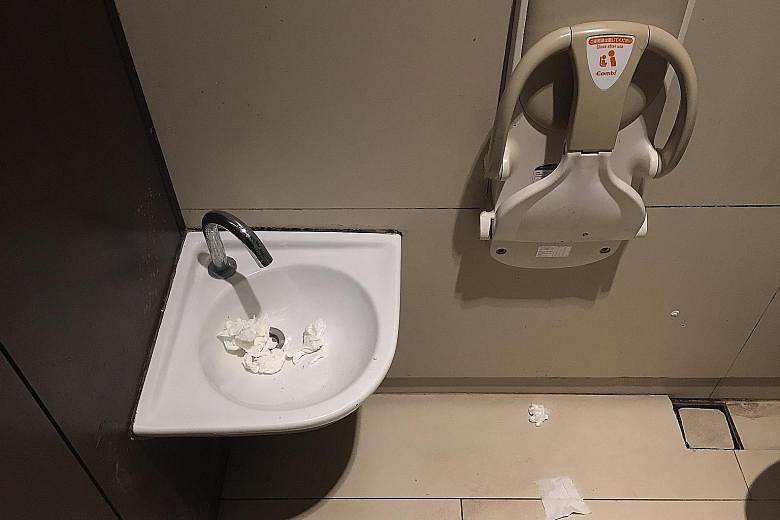Actress and comedian Siti Khalijah Zainal is at her energetic best, clad in an eye-popping multi-coloured outfit and combining rapping, singing and dancing with deceptive ease.
"Hey Singapore, this is just for you," she declares, "a simple jam that you do in the loo."
That simple jam, as it turns out, refers not to dancing in the toilet but four steps for keeping toilets clean.
The four steps are: flushing, cleaning the toilet seat, binning litter and drying surfaces that have been made wet.
This Facebook video titled Loo Jam and featuring Ms Siti is the latest effort to raise awareness of public toilet hygiene by the National Environment Agency (NEA) and Clean & Green Singapore.
NEA launched its Public Toilet Cleanliness initiative on June 18.
Public toilet hygiene has been an issue in Singapore for decades, with the then Ministry of Environment launching the first Keep Public Toilets Clean campaign in 1983.
Experts said the video, which has been received positively by netizens, is a good start, but that more needs to be done for systemic change to happen.
"I think it's a very good effort and the four steps are helpful. The video could certainly appeal more to younger viewers who are on social media," said Singapore Management University (SMU) senior lecturer of statistics Rosie Ching, who with 157 SMU undergraduates conducted a survey of more than 1,000 toilets in hawker centres and coffee shops earlier this year.
"But is (the message) going to reach those in the older age bracket or coffee shop operators who might just see it as a gimmick?"
The survey, which polled about 6,000 patrons on toilet cleanliness at 104 out of 114 hawker centres and 1,181 of the 1,330 coffee shops across Singapore from Jan 10 to Feb 7, found that toilets had become dirtier since an earlier study also conducted by Ms Ching in 2016.
More than a quarter of those polled said they would not use toilets at hawker centres and coffee shops, with coffee shop toilets deemed significantly dirtier than hawker centre toilets.
The condition of public toilets in five locations in Jurong East visited by The Sunday Times yesterday left something to be desired.

-
TOILET CLEANLINESS STUDY
>25% Proportion of those polled who said they would not use toilets at hawker centres and coffee shops.
5,948 Number of hawker centre and coffee shop patrons surveyed.
Toilets in Westgate mall were the dirtiest, with copious evidence of users not cleaning toilet seats or binning their litter, while a squat toilet in Jurong East MRT station was found to be blocked or unflushed.
Public Hygiene Council (PHC) chairman Edward D'Silva said the video brought to mind the wave of videos that went viral earlier this year featuring healthcare workers around the world dancing and singing to raise awareness about good habits to prevent the spread of Covid-19.
"It's good to see NEA changing their approach from the (previously) rather staid way of addressing the public," said Mr D'Silva.
He added that the PHC is also trying to find ways to engage specific segments of people, noting that parents, for example, have an important role to play in whether children pick up the right hygiene habits early.
But raising public awareness of good habits also has to go hand in hand with engaging coffee shop operators and other stakeholders who are responsible for the day-to-day maintenance of public toilets, Ms Ching said.
"Public toilet infrastructure needs to be upgraded, and I don't see many coffee shop operators invested to do something about it," she added.
"It's a tricky situation. If you are saying that it's only users who have to clean up their act, then you could be reinforcing the beliefs of recalcitrant coffee shop operators that they don't have to do anything about the problem."
An NEA spokesman said the agency will introduce a Toilet Improvement Programme for toilets in coffee shops and hawker centres with ageing infrastructure later this year.
The programme will provide co-funding for infrastructural improvements and accelerate the adoption of new technologies and productivity measures for toilet cleaning and maintenance.
Restroom Association of Singapore executive director Emerson Hee said the association revised standards upwards for its voluntary Happy Toilet programme in April to reflect the need for better toilet infrastructure.
The programme awards public toilets a rating from three to six stars.
For a toilet to get four stars, it must now have implemented at least one smart cleaning solution from one of four categories, ranging from sensors which provide smell alerts to feedback panels and anti-stain coatings for surfaces.
"We are also working with NEA to provide training to cleaners starting with (those in) coffee shops," Mr Hee said.
- Additional reporting by Shintaro Tay



